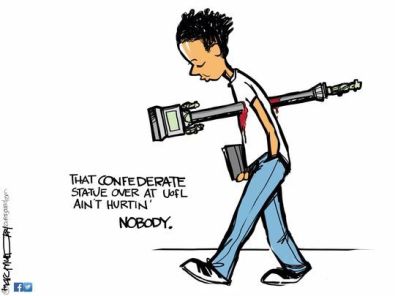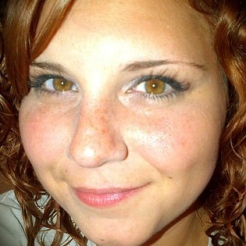
Yes, yes, I’ve absolutely been excited about what happened to me this week. After 25 years of plugging away, and nearly 15 years after publishing Dixie’s Daughters, the national media decided that I “might” be an expert on the subject of Confederate monuments and so I finally got the opportunity to say something about a subject that has long been assumed to be the purview of male historians.
But guess what? A lot of folks didn’t like it.
I posted enthusiastically on my personal Facebook page (to the tsk tsk of some), because nothing like this has ever, ever happened to me in my entire career. My bone fides include a PhD from the University of Southern Mississippi. That alone made it hard enough to break into academia, much less write for newspapers with a national reach. So, I got a little excited. And as anyone knows, Facebook does not tell one’s entire story. It’s always the curated version.
So let me tell you what I didn’t post about. I was a little scared as the time approached for the op-ed to go online. I worried for my safety after what I saw unravel in Charlottesville over the weekend. I took measures to notify my chair and my dean about my concerns. I worried my mother who, I will state for the record, does not always agree with my public writing.
I also took a lot of heat online and via email for having dared to place these objects of southern heritage in their proper historical context. And I say heritage, because heritage is about memory and memory is not history. That is a hard point to make with diehard defenders of Confederate memorials. The fact that they are memorials, which by their very nature are about memory, ought to make that point clear.
On the very first day that my op-ed in the New York Times appeared, I received this from a man named Edward Just:

While this vile, sexist, and racist email was the worst of the bunch, there were others who emailed to tell me I was an “opportunist,” “naive,” and that I had done nothing more than engage in a “pompous rant,” “unhinged hyperbole,” and “feminist agitprop.” “I find your NYT article repugnant and your views are Orwellian,” wrote another, and most perplexing of all came the question “when did white lives cease to matter?” In short: never.
There were also the more than 1300 online comments for the Times, which I barely looked at, because one should never look at the online comments. But there, as in emails, I still did not garner the respect of a professor. I was addressed as “Ms. Cox,” and complete strangers spoke to me and offered history “lessons,” calling me by my first name as if I was their neighbor from down the street.
To be fair, there were those who offered their thanks for my perspective and understood that while I was not on the front lines in Charlottesville, speaking truth to power in the context of our times takes some courage.
 I say that knowing that whatever courage I showed pales by the courage it takes to simply be black in today’s America. I benefit from and am protected by white privilege. What I wrote about Confederate monuments cannot be equated with how black southerners must feel in seeing these tangible reminders of their treatment at the hands of people who did not, and still do not, care about their humanity.
I say that knowing that whatever courage I showed pales by the courage it takes to simply be black in today’s America. I benefit from and am protected by white privilege. What I wrote about Confederate monuments cannot be equated with how black southerners must feel in seeing these tangible reminders of their treatment at the hands of people who did not, and still do not, care about their humanity.

And I never for one second forgot about the tragedy that befell Heather Heyer, and those still recovering from their injuries after a devastating act of domestic terrorism.
I’m simply a historian and I got a chance to write about something I know and have studied for more than two decades. And yes, I was honored that I could add my voice to something that is not only a national conversation, but an international one.
Because the world is watching.
Thank you for your courage. Very grateful.
LikeLike
Thank you for sharing. I really appreciate your perspective as an expert who is not being acknowledged that way, and for your position as a scholar saying things that people of certain political persuasions don’t want to hear. I can relate. You are brave to call out the sexism attached to the racism here.
LikeLike
Thank you.
LikeLike
Excellent. Thank you for sharing.
LikeLike
Your op-ed inspired me to write a letter to the editor in response to a letter in my hometown newspaper (Fredericksburg, VA). The writer did the Lost Cause dance and tied it to, of all things, the Deep State trying to bring down Trump, which one must admire simply on the basis of ambition. [wink]
Your writing and some research on the Crittenden Compromise gave me the basis of a rejoinder. Hopefully it gets published and thanks for the motivation and background. And please, continue advocating for a fact-based reality.
LikeLike
Thanks for sharing your expertise. It takes a lot of courage to speak truth to power. I know what it is like to write op-eds that run counter to vested interests. People were afraid for my safety. I thought it was my professional and personal responsibility and I have no regrets. We support you.
LikeLike
Congratulations on your editorial and thank you for putting your expertise out there in the public sphere. It’s rather challenging to be a historian these days!
LikeLike
Thank you for your courage to represent the past with all its warts. The US has always been a rather anti-intellectual place but it is pretty scary these days. I haven’t read the book but would like to.
LikeLike
Speaking truth to power is and always has been difficult and is often frightening. I have been proud of your many accomplishments for the 30 years I’ve known you, but never more so than this past week.
LikeLike
Thanks, my friend.
LikeLike
I am glad that you wish to remove these statues. Until we erase the past we cannot reclaim it. Thank you for support.
LikeLike